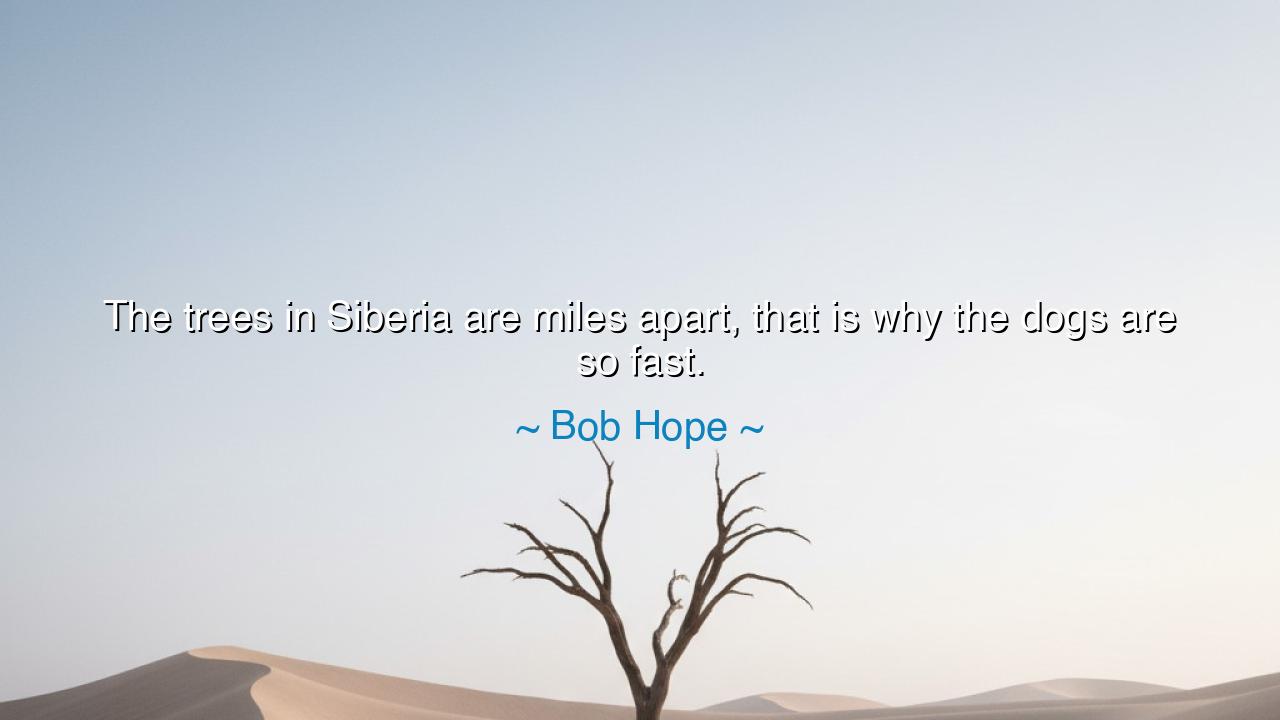
The trees in Siberia are miles apart, that is why the dogs are






Bob Hope, master of wit and laughter, once quipped: “The trees in Siberia are miles apart, that is why the dogs are so fast.” At first, these words strike the ear as nothing more than humor, a playful jab at the vastness and emptiness of Siberia. Yet as with much of Hope’s comedy, hidden beneath the jest lies a truth about hardship, survival, and the strange ways environment shapes both beast and man. In this saying, the dog becomes a symbol of resilience, driven not by choice but by necessity, and the trees stand as markers of scarcity, shaping the very pace of life.
The origin of this line lies in Hope’s long career of entertaining soldiers and weary crowds, where humor was often a medicine for hardship. By turning the loneliness of Siberia into a joke, he gave his listeners a way to laugh at isolation, to see not only barrenness but also the vitality and speed that arise when one must run across great distances. The barren spaces of life, though they seem empty, create strength, endurance, and unexpected gifts. Thus, in the playful remark about fast dogs, there is also an ancient truth: adversity sharpens the spirit.
Think of the Siberian huskies themselves, famed for their swiftness and stamina. In the harshest winters, across snowfields with little shelter, they carried sleds over impossible distances. They did not run for glory but because survival demanded it. Their speed was born not of luxury but of the spaces between—between hunger and food, between danger and safety, between life and death. Hope’s jest, then, reflects reality: in a land where even the trees are miles apart, strength and speed are forged in necessity.
History offers us kindred stories. During the great Serum Run of 1925, sled dogs raced across nearly seven hundred miles of Alaskan wilderness to deliver medicine to the town of Nome, saving countless lives from a diphtheria outbreak. It was not fertile fields or gentle climates that produced such heroism, but the unforgiving expanse of snow, wind, and distance. The very emptiness of the land made the dogs strong, swift, and enduring. What seems barren to some becomes the forge of greatness for others.
And so it is with human beings. When life places us in lands where the trees are miles apart—when support is scarce, when comfort is distant, when we feel alone in cold and silence—we may despair at first. Yet these very trials call forth our swiftness, our resilience, our hidden strengths. Just as the dogs run faster in the empty spaces, so too do we discover our capacity when the world stretches wide and unforgiving before us.
The lesson, then, is clear: do not curse the barren stretches of your life. Do not despair when the trees of comfort and companionship seem far apart. For it is in these distances that endurance is trained, that speed of spirit is gained, that the soul learns to run. Adversity is not the end—it is the training ground of greatness.
Practically, this means embracing challenge rather than fleeing from it. When you find yourself in isolation, use it to sharpen your mind. When comfort is distant, let the distance strengthen your resolve. When the path is long and empty, remember the Siberian dogs: the emptier the land, the faster they ran. In the same way, your greatest struggles may unlock your greatest strengths.
So let Bob Hope’s words linger beyond their jest: “The trees in Siberia are miles apart, that is why the dogs are so fast.” They remind us that humor hides truth, that emptiness can create endurance, and that adversity, though harsh, is the very fire that forges speed, strength, and resilience. Learn to run in your own Siberia, and you will discover that what once seemed desolate has made you unbreakable.






AAdministratorAdministrator
Welcome, honored guests. Please leave a comment, we will respond soon